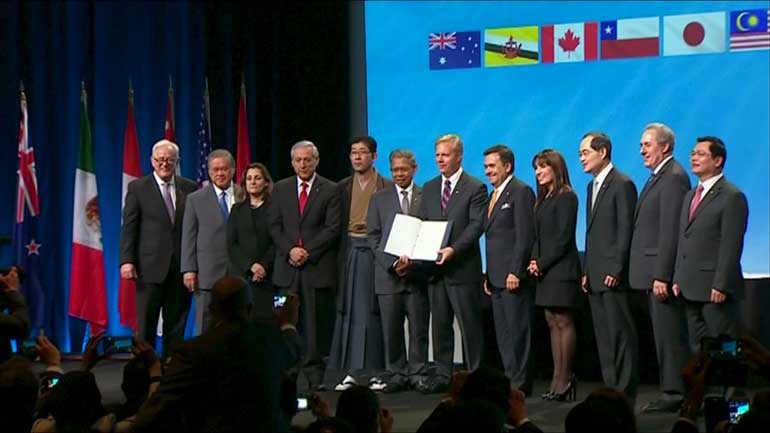Monday Feb 23, 2026
Monday Feb 23, 2026
Friday, 5 February 2016 00:00 - - {{hitsCtrl.values.hits}}

Trade ministers and officials from the 12 Trans-Pacific Partnership (TPP) member nations are seen at the signing ceremony in Auckland, New Zealand in this still frame taken from video on February 4, 2016. REUTERS
AUCKLAND: The US-led Trans-Pacific Partnership, one of the biggest trade deals in history, was signed in New Zealand on Thursday (Feb 4) by all 12 member nations amid loud protests.
While New Zealand Prime Minister John Key and US Trade Representative Mike Froman led the ceremony at Auckland’s Sky City Convention Centre, protestors blocked roads outside.
The ambitious pact aims to break down trade and investment barriers between countries comprising about 40 per cent of the global economy.
“Today is a significant day, not only for New Zealand but for the other 11 countries in the Trans-Pacific Partnership,” Key said.
US President Barack Obama immediately hailed the signing, saying the TPP would give the United States an advantage over other leading economies, namely China.
“TPP allows America - and not countries like China - to write the rules of the road in the 21st Century, which is especially important in a region as dynamic as the Asia Pacific,” Obama said in a statement from Washington.
However, protesters argue it will cost jobs and impact on sovereignty in Asia Pacific states.
Although the signing marks the end of the negotiating process, the member countries still have two years to get the deal approved at home before it takes effect.
“We will encourage all countries to complete their domestic ratification processes as quickly as possible,” Key said.
“TPP will provide much better access for goods and services to more than 800 million people across the TPP countries, which make up 36 per cent of global GDP.”
The agreement was signed by Australia, Brunei, Canada, Chile, Japan, Malaysia, Mexico, New Zealand, Peru, Singapore, the United States and Vietnam.
“Other countries have already signalled an interest in joining TPP,” Key said.
“And this could lead to even greater regional economic integration. A more prosperous and therefore secure region, is in all of our interests.”
Froman warned that any delay in endorsing the deal would come at a cost.
“After five years of negotiation, signing the TPP is an important milestone in our efforts to set high-standard rules of the road in the Asia-Pacific region and more generally, and to deliver an agreement that will benefit American workers, farmers and businesses,” he said.
Claiming the deal stands to add $100 billion a year to US economic growth, Froman added: “There are costs to delay, real economic costs.”
Groups opposed to the TPP have expressed concern about the secrecy in which the negotiations were conducted, the potential erosion of a country’s sovereignty and say it is weighted in the United States’ favour.
Amid speculation that members of the US Congress will not want to risk alienating voters by approving it ahead of the November national elections, Obama on Tuesday discussed ratification with Republican leaders who said they still had problems with the complex deal.
New Zealand is acting as the TPP depositary, taking responsibility for administrative functions.